annual report1-final.qxd - Overseas Indian
annual report1-final.qxd - Overseas Indian
annual report1-final.qxd - Overseas Indian
Create successful ePaper yourself
Turn your PDF publications into a flip-book with our unique Google optimized e-Paper software.
Pravasi Bharatiya Divas<br />
Pravasi Bharatiya Divas<br />
Pravasi Bharatiya Divas<br />
Pravasi Bharatiya Divas<br />
! Coverage to be extended from Rs. 2 lakh to Rs. 5 lakh.<br />
! Starting of pre-departure Orientation<br />
Programmes for overseas workers with the help of<br />
State Governments.<br />
! Issue of smart cards for emigrant workers<br />
containing all information regarding his/her<br />
employment and insurance.<br />
! Providing 24x7 helpline at 13 identified missions.<br />
! Providing legal aid to overseas workers in<br />
cases of labour related problems.<br />
! Involving NGOs as information resource centers<br />
for providing advice to potential overseas<br />
workers.<br />
! Setting up of the Central Manpower Export<br />
Promotion Council for assigning current requirements<br />
and projecting future labour needs in foreign<br />
destinations.<br />
! Setting up of an <strong>Overseas</strong> Workers’ Welfare<br />
Fund either by providing a one-time lump sum<br />
grant by the Government or by charging a nominal<br />
amount from the emigrants while granting emigration<br />
clearance.<br />
! Initiatives had been taken to chalk out memorandums<br />
of understanding (MoUs) on manpower<br />
with Oman and Maldives.<br />
In the end, he talked about the importance of<br />
updating the national manpower profile and<br />
reviewing the skill profile in relation to foreign<br />
employment demand and enhancing quality and<br />
certification process.<br />
Binod Khadria, the keynote speaker, gave a presentation<br />
on the theme of overseas employment. He<br />
opined that international migration had risen to the<br />
top of the global policy agenda but the international<br />
community had failed to capitalise on the opportunities<br />
and meet the challenges associated with it.<br />
In his presentation, he pointed out that there was<br />
an unwarranted dichotomy between skilled and<br />
unskilled migrant workers. All of them could legitimately<br />
form part of ‘essential workers’, as referred<br />
in the GRIM Report, 2005.<br />
He talked about the four steps towards an<br />
untapped powerhouse: generic classification of<br />
knowledge and service worker; identifying the<br />
stakeholders; spelling out the supplying and<br />
receiving country stakes in streamlining the service-worker<br />
migration from India (here he pointed<br />
out that low cost labour replacements gave the<br />
receiving countries the advantage of age, wage and<br />
vintage); and job-search, job-certification, hedging<br />
against uncertainties, compensation mechanism,<br />
return passage (preventive as well as curative). He<br />
also spoke about a training, certification and<br />
accreditation hub in South Asia.<br />
Ali Shabbir Mohd talked about the steps taken by<br />
the Andhra Pradesh Government for the <strong>Indian</strong><br />
diaspora. He said that his Government now had a<br />
separate Department for the <strong>Indian</strong> diaspora on the<br />
lines of the Kerala model.<br />
Madhavan, President of the Sharjah <strong>Indian</strong><br />
Association, pointed out that NRIs in the Gulf were<br />
facing many problems. Talking about the children<br />
of the NRI families, he wanted the Government to<br />
reserve some quota in official colleges in India. He<br />
said NRI families back home too faced a lot of<br />
problems and the Government should take note of<br />
these things. He also requested that NRI identity<br />
cards should be given.<br />
K. Kumar said that he had spent 35 years of his<br />
life in Dubai and was working for the cause of the<br />
<strong>Indian</strong> community at Dubai. His main concern was<br />
about the exploitation of women. Another major<br />
issue that he talked about — and many of the delegates<br />
during the discussions raised that issue —<br />
was about the repatriation of human remains. He<br />
pointed out that nobody was looking at this issue.<br />
In Dubai, it was being taken care of by the <strong>Indian</strong><br />
Community Welfare Committee, which was just an<br />
organisation. He also talked about the increasing<br />
number of deaths and suicide, homesickness and<br />
unfulfilled dreams of the NRI community in the<br />
Gulf region.<br />
There were short presentations by Abhay Mehta,<br />
T.K. Jose and Suresh Kumar, and most of them<br />
expressed similar concerns and recommended<br />
steps for a better engagement.<br />
In the discussions that followed, there was a lot<br />
of heated debate on various problems that the NRIs<br />
in the Gulf faced. Many of the delegates put their<br />
community and personal experiences in their<br />
respective country of engagements in the Gulf<br />
33


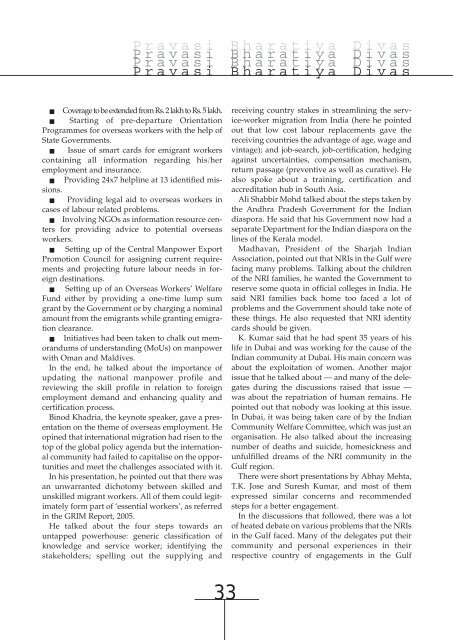
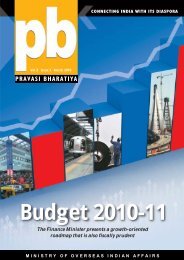
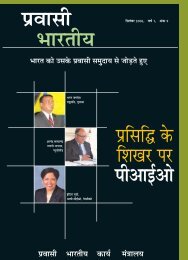

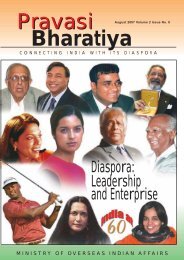

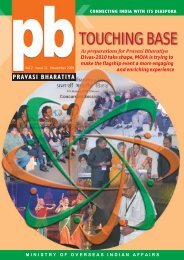
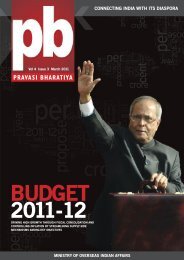
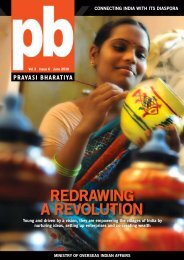
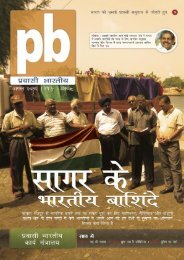

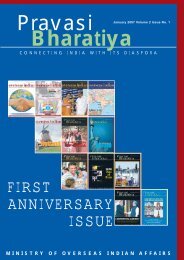
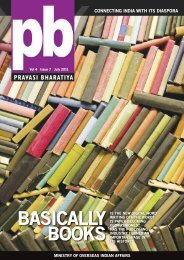
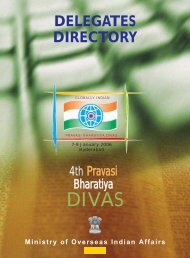
![flaxkiqj feuh izoklh Hkkjrh; fnol] vDVwcj 9&11 - Overseas Indian](https://img.yumpu.com/43977040/1/184x260/flaxkiqj-feuh-izoklh-hkkjrh-fnol-vdvwcj-911-overseas-indian.jpg?quality=85)
